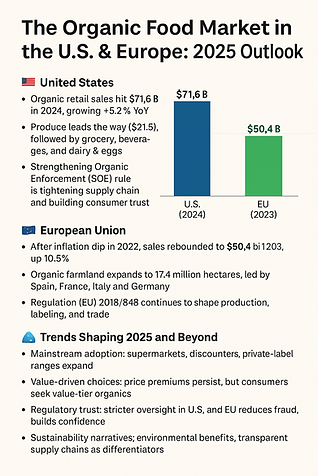Organic Farming and Foods

Dr. Pavlo Pysarenko
Doctor of Agricultural Sciences, Professor
Senior Partner, Organic Farming
In today's fast-paced world, people are becoming more conscious of what they eat and how their food is produced. ABM Food and Agriculture is committed to promoting organic farming and offering high-quality organic products that benefit both people and the environment. But why should you support organic farming, and how do organic foods enhance health and well-being?
The Importance of Supporting Organic Farming
-
Better for Your Health Organic foods are grown without synthetic pesticides, herbicides, or genetically modified organisms (GMOs). This means you get pure, nutrient-rich food without harmful chemical residues. Studies suggest that organic produce contains higher levels of antioxidants, vitamins, and essential minerals, supporting overall health and immunity.
-
Eco-Friendly and Sustainable Organic farming practices focus on soil health, biodiversity, and water conservation. By avoiding synthetic chemicals, organic farmers protect ecosystems, preserve soil fertility, and reduce pollution. This helps combat climate change and ensures a sustainable future for the planet.
-
Supports Ethical and Humane Farming Organic farming emphasizes humane animal treatment, free-range livestock, and natural diets without antibiotics or growth hormones. Supporting organic agriculture means advocating for animal welfare and ethical food production.
Best regards,
ABM Food & Agriculture team
The Health Benefits of Organic Products
-
Higher Nutritional Value: Organic foods often have more essential nutrients compared to conventional alternatives.
-
No Harmful Chemicals: Avoiding synthetic additives reduces the risk of health issues linked to pesticide exposure.
-
Improved Digestion: Many organic products, especially whole grains and fresh produce, promote better gut health.
-
Better Taste: Without artificial preservatives and chemicals, organic foods often taste fresher and more flavorful.
Choosing organic products is an investment in your health, the environment, and the future of sustainable agriculture. ABM Food and Agriculture invites you to make a positive impact by supporting organic farming and enjoying the benefits of clean, natural food.
Explore our selection of premium organic products today and experience the difference of nature’s best!
#Agriculture #organicfood #OrganicFarming #healthyfood #wellness
The Organic Food Market in the U.S. & Europe: 2025 Outlook
The global appetite for organic food continues to rise, with both the United States and the European Union showing strong momentum in 2025.
United States
-
Organic retail sales hit $71.6 billion in 2024, growing +5.2% YoY, more than double the overall food market growth.
-
Fresh produce leads the way ($21.5B), followed by grocery staples, beverages, and dairy & eggs.
-
Regulatory shifts, like USDA’s Strengthening Organic Enforcement (SOE) rule, are tightening supply chains, building consumer trust, and creating opportunities for exporters who can meet compliance requirements.
European Union
-
After an inflation-related dip in 2022, sales rebounded to $50.4 billion in 2023, up +10.5%.
-
Organic farmland expanded to 17.4 million hectares, with Spain, France, Italy, and Germany driving growth.
-
Leaders in per-capita spending include Denmark (~$440 per person), with Germany and France remaining the largest overall markets.
-
The EU’s Regulation (EU) 2018/848 continues to shape production, labeling, and trade, with a clear trajectory toward the 25% organic farmland target by 2030.
Trends Shaping 2025 and Beyond
-
Mainstream adoption: Organics are no longer niche—supermarkets, discounters, and private-label ranges are bringing organic options to the mass market.
-
Value-driven choices: While price premiums persist, consumers are seeking value-tier organics that combine trust with affordability.
-
Regulatory trust: Stricter oversight in both the U.S. and EU strengthens consumer confidence, reduces fraud, and increases opportunities for verified exporters.
-
Sustainability narratives: Environmental benefits and transparent supply chains continue to be strong differentiators.
#OrganicFood #Sustainability #FoodTrends #OrganicMarket #EU #USA #Agribusiness #FoodIndustry #FutureOfFood #SustainableFarming #OrganicGrowth #FoodInnovation





